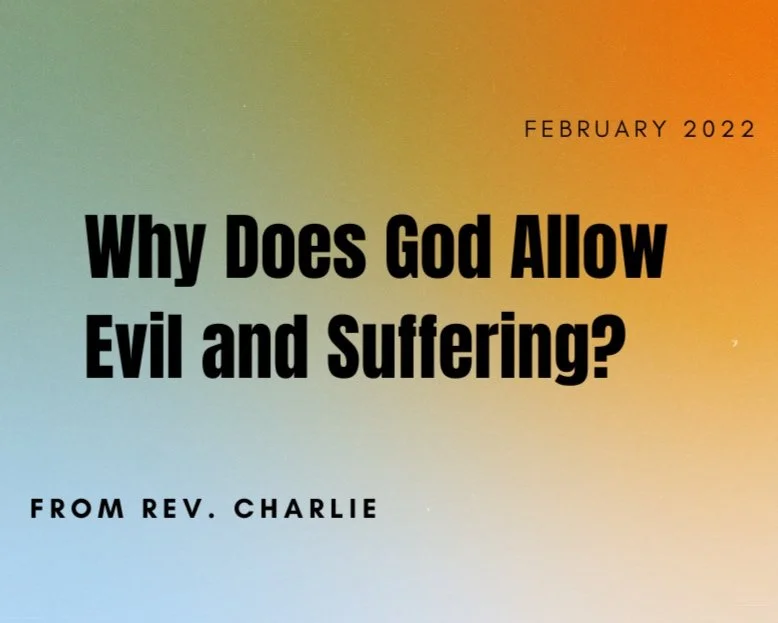Why does God allow evil and suffering?
Rev Charlie (February 2021)
There is an old argument against Christianity and against theism in general that goes something like this: if God is all-powerful yet allows suffering, he cannot be good - and if God is good yet allows suffering, he cannot be all-powerful. This seems to make logical sense, unless of course God has morally sufficient reasons for allowing evil and suffering.
Since I believe in a God who is both good and all-powerful I have to believe that God does have morally sufficient reasons for allowing evil and suffering. This is clearly a very complex subject, so I will attempt to delineate just one possible reason among many.
According to the book of Genesis (right at the beginning of the Bible), God created a good world that was corrupted by human sin and rebellion against God. One might ask the question, ‘Could God not have created a world in which there was no chance of there ever being any evil?’ and the answer is, ‘Yes, he could have, but we wouldn’t exist in such a world.’ God created human beings with freewill and the ability to make moral choices, without which there could be no love because love is a choice. God could have created robotic like beings who would always obey him, but that would preclude the possibility of genuinely loving relationships.
The story of the Bible from Genesis 2 onwards is all about what God is doing to put the whole of creation right and especially the broken relationship that exists between human beings and himself. Contrary to popular belief, God’s aim is not to make us as happy as possible in this life, but rather to draw us into relationship with himself so that we can live forever with him in a renewed and restored creation, where there is no pain, suffering or evil of any kind.
We cannot possibly know what kind of world would be most conducive to drawing the maximum number of people into God’s kingdom, but since we know this to be God’s aim we must conclude that it is just the kind of world that we live in, suffering and all.
We are quick to blame God for evil and suffering, but what part do we have to play in all this? Generally speaking, there are two kinds of evil, moral and natural. Moral evil is the result of human choices, for example a terrorist attack such as 9/11. Natural evil is essentially events that are beyond human control, for example, a tsunami. However, you cannot always separate these two kinds of evil. For example, studies have shown that Tsunami’s are far more devastating in poor regions where people live in flimsy homes and areas
that are prone to flooding. In many cases, moral evil compounds the impact of natural evil. In this case, the moral evil would be an uneven distribution of wealth and disregard for the poor. Another example is medical science. Imagine if all the time, money and resources that have been invested in warfare and the development of weapons was invested in medical research instead. This could have prevented an incalculable amount of human suffering and it is easy to think of innumerable examples like that one. So, before we blame God for evil and suffering, we should remember that human beings have the potential to alleviate the vast majority of evil, both moral and natural.
The arguments above are quite philosophical, but our reaction to evil and suffering is usually an emotional one. We must therefore remember that the cross of Christ is central to the Christian faith. We do not worship a distant and aloof God, who looks on his creation with indifference. We worship a God who entered into creation in the person of Jesus Christ to suffer and die on our behalves. In short, we worship a God who understands our pain and suffering from firsthand experience and stands alongside us in it.
Finally, it is helpful to understand that even our suffering can have meaning and purpose when we turn it over to God and say, ‘Lord, use this.’ That is not to say that God causes our suffering, rather he can use anything to his good purposes if we will allow him to.
This is clearly a huge subject and very difficult to summarise in one short article. If you would like to explore this subject further, I recommend the following publications:
Walking with God through Pain and Suffering – Timothy Keller
The Problem of Pain – C.S. Lewis









